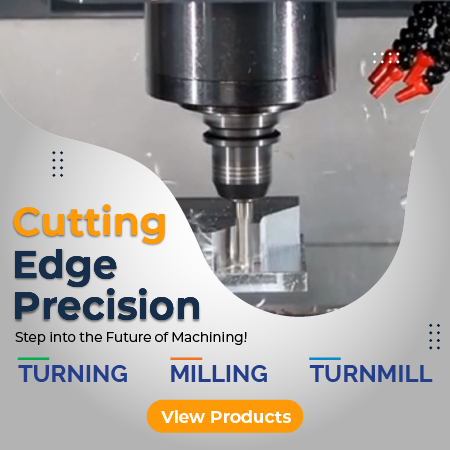Driving Innovation: 5 Ways CNC Machining Transforms Auto Component Manufacturing
In the intricate world of auto components manufacturing, the fusion of precision and efficiency is paramount. The advent of CNC machines has become a transformative force, reshaping how automotive parts are produced. This blog delves into the multifaceted impact of CNC machining on the auto components industry.
Why CNC Machining is Crucial in Auto Components Manufacturing
CNC machining is indispensable in auto component manufacturing for several compelling reasons. The automation capabilities of CNC machines contribute significantly to increased productivity in the sector. With CNC turning machines, milling machines, turnmill machines, and lathe manufacturing, the industry experiences continuous operation, 24/7, minimizing human intervention and reducing downtime. This results in a streamlined and efficient manufacturing workflow, meeting the growing demands of the automotive market.
Increased Productivity
The automation capabilities of CNC machines contribute significantly to increased productivity in auto component manufacturing. These machines can operate continuously, 24/7, with minimal human intervention. This not only accelerates the production process but also reduces downtime, resulting in a more streamlined and efficient manufacturing workflow. The ability to produce complex components at a faster rate enhances overall output, meeting the growing demands of the automotive market.
Precision Engineering
CNC machines are renowned for their exceptional precision, making them indispensable in the production of auto components. These machines follow intricate design specifications with unparalleled accuracy, ensuring that each component meets the exacting standards required in the automotive industry. Whether it's milling, turning, drilling, tapping, boring, threading, CNC machines deliver precision engineering that is crucial for the functionality and safety of automotive parts.
Versatility in Component Design
The automotive industry is marked by constant innovation and evolving design requirements. CNC machines offer unparalleled versatility, allowing manufacturers to produce auto components with diverse shapes, sizes, and functionalities. The flexibility to adapt quickly to changing design specifications positions CNC machining as a cornerstone for staying ahead in a competitive market that demands constant innovation.
Quality Control and Consistency
Maintaining consistent quality is imperative in auto component manufacturing, and CNC machines play a pivotal role in achieving this. The automated nature of CNC machining eliminates the variability introduced by human factors, ensuring that each component adheres to strict quality standards. This consistency is crucial for building reliable and safe vehicles that meet the expectations of both manufacturers and consumers.
Advancements in Materials and Tooling
CNC machining has kept pace with advancements in materials and tooling technologies. This adaptability allows manufacturers to work with a wide range of materials, including alloys and composites, expanding the possibilities for lightweight, durable, and performance-enhancing auto components. The ability to leverage cutting-edge materials and tooling techniques positions CNC machining as a driving force behind the continual improvement of automotive components.
In conclusion, CNC machining's application in auto components manufacturing is a transformative journey marked by precision, efficiency, and adaptability. Embracing CNC technology becomes not just a choice but a necessity for manufacturers striving to meet the demands of innovation, quality, and cost-effectiveness, shaping the future of automotive manufacturing.



